Stories From Our Communities
Written by Emily Matlock
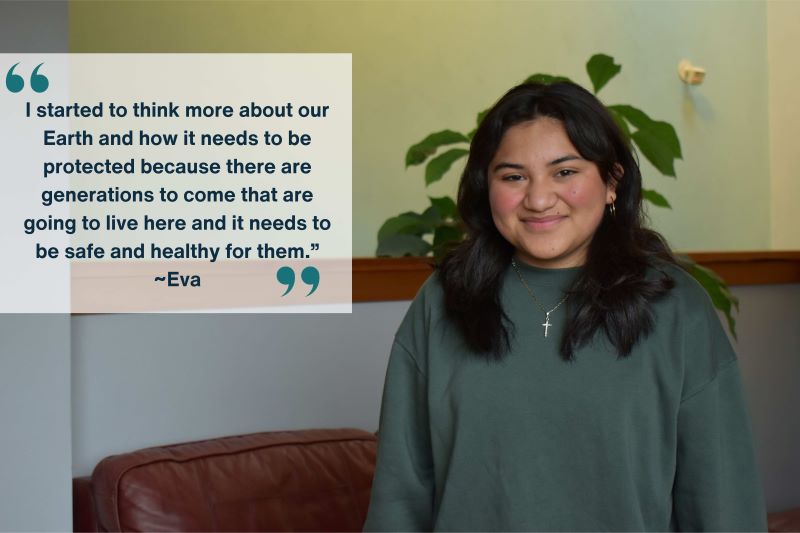
Eva's Story
For Eva, the 2019 wildfires in her California hometown were the catalyst for her interest in environmental justice work. She, and many of her friends and neighbors had to leave their homes, scared and with limited access to resources.
Now a high school student in Eugene, Eva joined Beyond Toxics’ Resilient Leaders in Action fall cohort to connect with other like-minded students who want to make a difference in their communities.
After the fires, “I started to think more about our Earth and how it needs to be protected because there are generations to come that are going to live here and it needs to be safe and healthy for them,” she said.
Eva is one of nearly 50 students who have completed our resilient youth leadership trainings. “I want to play a role in activism in the future, it’s not like the need is going to go away, if anything it’s going to keep getting worse,” she said.
Beyond Toxics empowers young BIPOC students to become leaders in the environmental justice movement and provides a network and tools to get started. Eva said Resilient Leaders has shown her that there is an opportunity to continue this work as an organizer or active community member in her future.
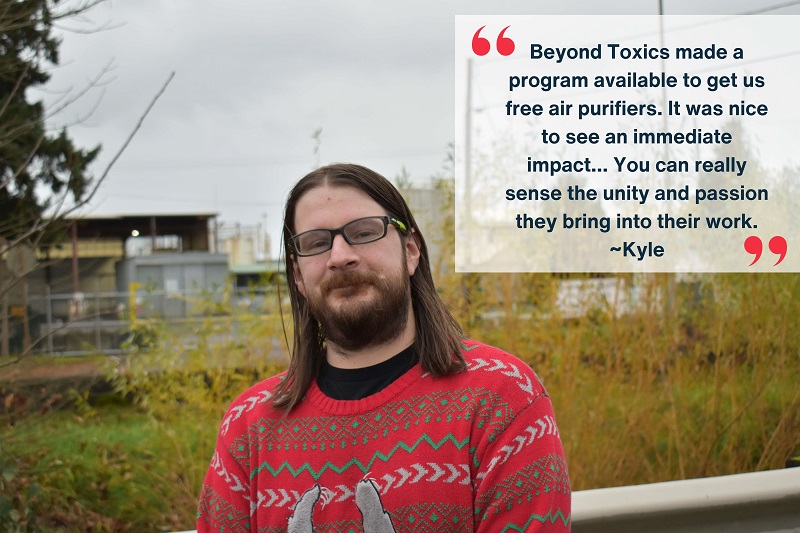
Kyle's Story
When Kyle moved to his west Eugene home, he knew he was looking for a place to bring his mom. She had COPD and other health issues, so Kyle knew he wanted to move her to Eugene from Chicago to care for her.
What he didn’t know was that J.H. Baxter, which operated just across Roosevelt Boulevard from his home, was contaminating the air and soil around his home. He didn’t know about the noxious creosote smell and harmful chemicals used in its wood treatment process.
He doesn’t know, still, if the pollution caused his mother’s health to decline quickly after moving there. Her bedroom was nearest J.H. Baxter, in an older home with old windows and poor weatherization. It was seemingly impossible to keep out toxic smells and pollutants from across the street. Kyle's mom was using a prescribed oxygen tank, and quickly needed more and more oxygen while living there, exceeding levels that standard oxygen tanks can typically support. She passed away in 2021.
“Some people would say that’s the progression of the disease,” Kyle said, but wondered aloud if the toxic air had something to do with it. “I’ll never know, but it’ll always weigh heavily on me.”
Moving forward
There are many unknowns that have arisen for members of the Bethel community since J.H. Baxter’s closure nearly two years ago.
Kyle's yard is slated for soil remediation after testing for high levels of dioxin contamination. The remediation, which was slated for this fall, is on hold yet again until at least March. For Kyle, this means another season lost of establishing groundcover, preparing to grow tomatoes or replanting trees and rose bushes. Tree removal began in October but has halted. The landscape of his neighborhood has changed. His yard now feels exposed to traffic and a popular bike path.
“I’ve had to roll with the punches,” Kyle said. “It's very unfortunate because it put our life at a standstill two years in a row now."
While J.H. Baxter has continued to show a lack of accountability for its role, Kyle said he's also frustrated by the slow process of soil testing and cleanup. He said it feels like there's nothing he can do but wait.
How we can help
Beyond Toxics works at the grassroots level with community members to ensure they are protected from egregious polluters now and in the future. One way we’ve done this is by providing free air purifiers to Bethel residents to mitigate harms of indoor air pollution, especially during soil remediation.
“It was nice to see an immediate impact,” Kyle said. “When I wasn’t able to make it to the park (to pick up an air purifier), I went into the office where I could really see the passion on the walls, in the art. A nonprofit is one of the best ways I can see to get people of like minds that can really work together to bring a positive change in the world together.”
Beyond Toxics will continue to advocate for West Eugene residents to ensure no more major industrial polluters are able to set up shop near homes, schools and parks. In addition, we are working with the city to implement public health standards into industrial zoning citywide to safeguard families from experiencing the environmental harms like that of J.H. Baxter again.
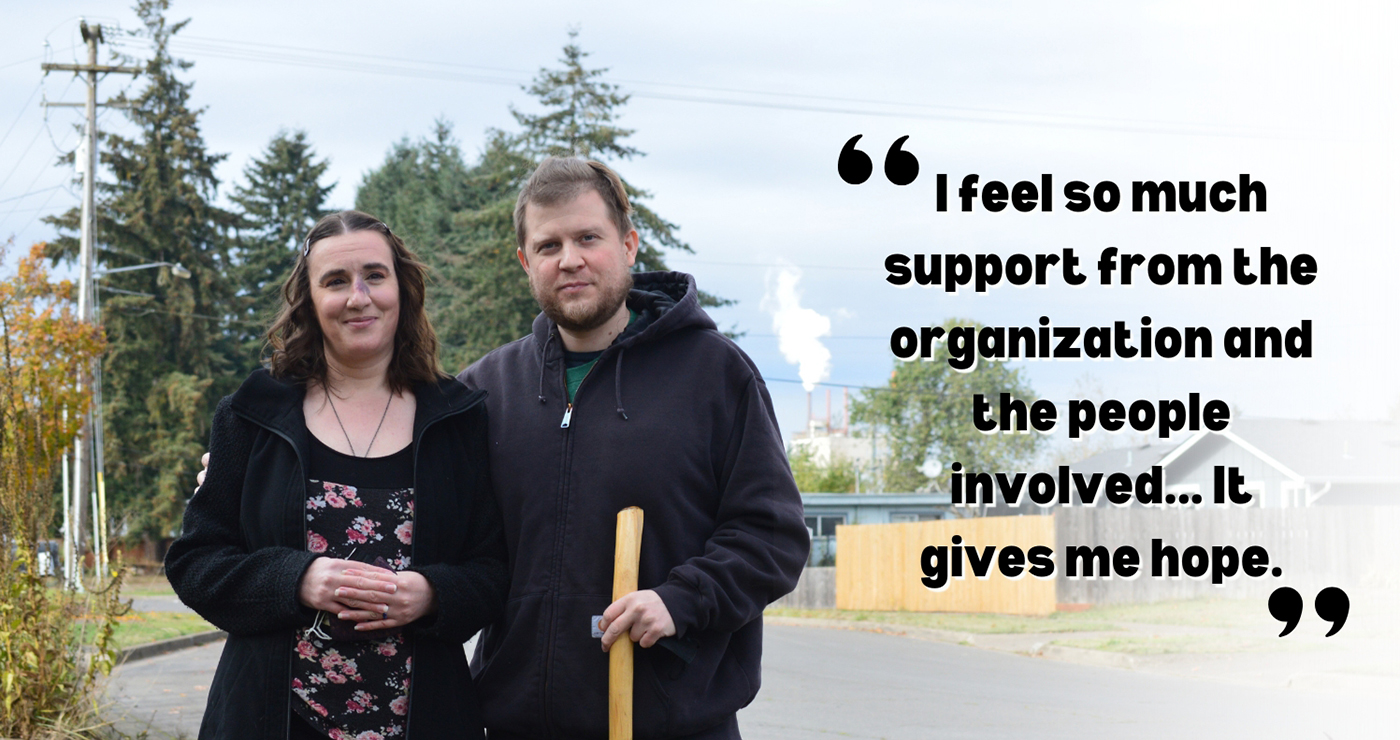
For nearly seven years, Jessi and James have lived in their current Springfield home. A plume of gray-white smoke billows out of smokestacks visible from their front yard. The smell is unmistakable. They live in the shadow of large industrial polluter International Paper.
In recent years, the family has faced a number of health issues. Their youngest, a nine-year-old, began experiencing eye irritation and nose bleeds after spending any amount of time outside. The older child, a fourteen-year-old, has had gastrointestinal issues his whole life, and was recently diagnosed with a condition that, if left unchecked, could lead to stomach cancer.
“As a mom, I am really passionate about taking care of my kids,” said Jessi. “That took up so much of my time – I didn’t really think about the health effects that it was causing me until I got told I had breast cancer.”
The family went looking for answers. Although they visited numerous doctors, none were able to identify the source of the problem. Tests revealed the parents aren’t genetically predisposed to cancer, and they lead otherwise healthy lifestyles. Though they wouldn’t name air pollution specifically, doctors agreed: their health issues are likely related to environmental causes.
“It’s kind of scary because I know that with every year that we’re here and (industrial polluters are) not being properly regulated, that I am possibly reducing my lifespan, reducing my children’s lifespan, reducing the possibility of my children even having families and children of their own,” Jessi said.
Jessi and James felt alone in their struggle against nearby industrial polluters and felt ignored by the agencies responsible for regulating them.
“This is potentially causing life-threatening illnesses for my family and the people that live here. I don't want to see people lose their jobs… We would just like to see some regulations put in place that the people who live near these places have their health taken into account, not just profits for rich people who don’t even live near these facilities,” Jessi said. “Low income people like ourselves are so impacted and nobody will listen.”
That’s where Beyond Toxics comes in. Our team has been laying the groundwork for grassroots community organizing in the neighborhoods affected by industrial polluters in Springfield. We’ve been listening to the community’s needs, conducting surveys and outreach to these neighbors and providing resources, such as air quality monitors, to families like Jessi and James.
“I feel so much support from the organization and the people involved. Nowhere in the United States is there an organization like Beyond Toxics that has that much outreach and that much compassion toward the community members,” James said. “Not just in our experience, but from what I’ve witnessed in west Eugene with J.H. Baxter."
“It gives me hope,” he added. “The future can be bright because there are people who care about the environment and about low income people.”
Jessi agreed that finding Beyond Toxics was like breathing a sigh of relief, knowing that they’re not alone in this struggle and that our team has had success with major industrial polluters.
Our team is working to ensure this community has the resources it needs to fight for the right to clean air. Our goal is to protect and empower families to stand up for their health and demand their governing agencies take their health into consideration when making decisions.
When you support Beyond Toxics, you’re supporting families like Jessi and James. You’re supporting clean air for families across the state and a just future for generations to come.
Andrea's Story
With the closure of one major industrial polluter, there is still work to be done.
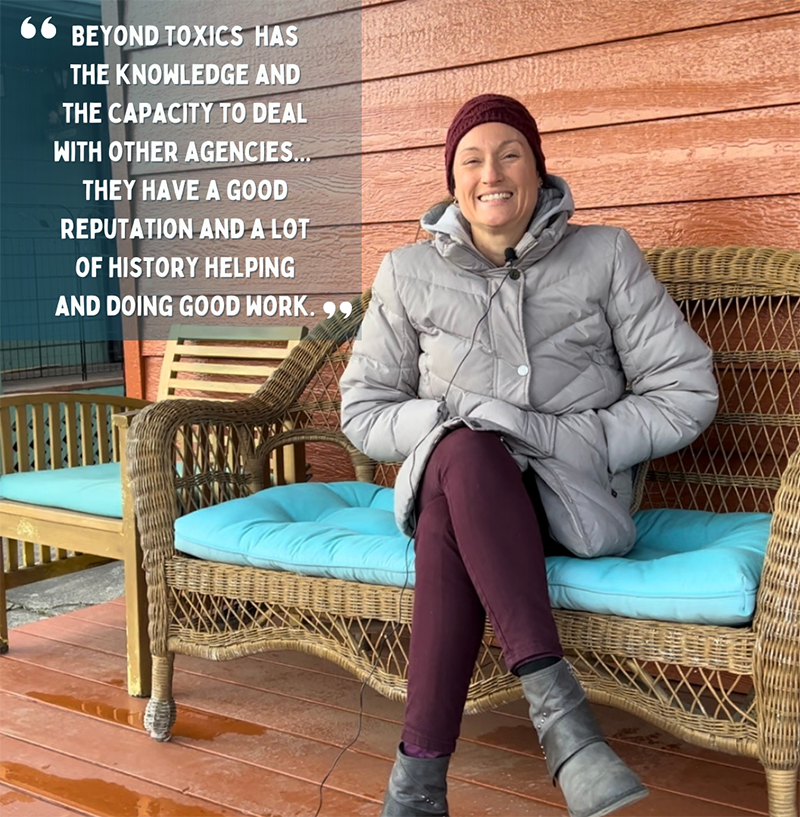
When Andrea moved into her West Eugene home in 2010, she wasn’t aware of the threat of industrial pollution looming in the neighborhood. She loves her family’s home and appreciates the diversity among their neighbors.
“We like it here,” she said, “But the problem with pollution has been a real detriment.”
She and her neighbors filed complaints with local agencies regarding horrible fumes from industrial facilities. When it felt like no one was listening, they wanted to give up.
“It was really discouraging,” said Andrea. “We didn’t have the means to just up and move, so it was tough.”
About a year ago, Andrea connected with Beyond Toxics and soon learned that we never give up. We worked relentlessly to shut down the wood treatment facility J.H. Baxter. Finally, in January 2022, the polluter was found to be the source of severe dioxin contamination and J.H. Baxter closed…and the community finally got the clean air it needed. But families in the Bethel area are still experiencing the lingering effects of industrial air and soil pollution on their health and wellbeing.
Though the plant closed, Andrea still smells horrible odors in the neighborhood from other polluters. Now, she’s concerned about the level of dioxins in the soil as well.
“We haven’t had the opportunity to have our yard tested, and gardening is a very big part of our lives,” Andrea said. “We eat the food from our yard and like to spend time outside so the issue with dioxins is very concerning.”
Companies like J.H. Baxter must be held accountable for the harm they create in the cities where they operate. Beyond Toxics is working to stop polluters that operate at the expense of the public good for decades and then close without consequence. Public health should be our priority.
“In the future, my hope for this neighborhood is that we can get a public health overlay zone to protect myself, my family and our neighbors from future pollution and toxins in the neighborhood,” Andrea said. She added that she hopes more community involvement will lead to Bethel becoming “a neighborhood that is respected and supported instead of pushed to the side to make room for industry.”
Beyond Toxics has the drive and the knowledge to keep fighting for clean air and healthy families like Andrea’s.
Mira and Matt's Story
In 2018, Mira and Matt purchased their first home together in West Eugene. They love the neighborhood and their neighbors, and said it’s the best part of Eugene they’ve lived in so far.
“It’s just the pollution part that we don’t love,” Mira said. “We’re surrounded by a variety of different industries.”
Between the multitude of factories, trains, and semi trucks frequenting the factories just across the expressway from their home, the noise and air pollution is noticeable here.
“We didn’t experience this in the other parts of Eugene that we lived in so getting used to it has been a process,” she said. “And it’s unfortunate because we shouldn’t have to get used to pollution.”
While working from home during the Covid-19 pandemic, the couple began to notice just how bad the toxic smells coming from the area’s industrial polluters. They began to wonder what they could do to change the situation. They joined Beyond Toxics’ community workgroup to take action and have since spoken with city council members and effectively promoted public health policies.
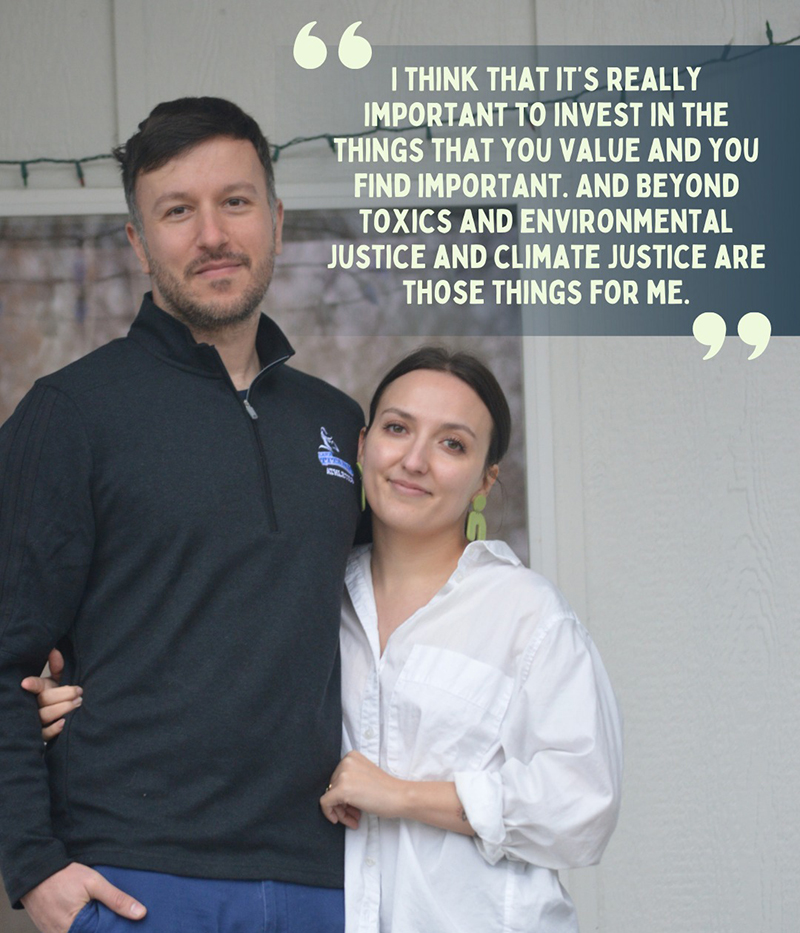
Jeremy and Ali's Story
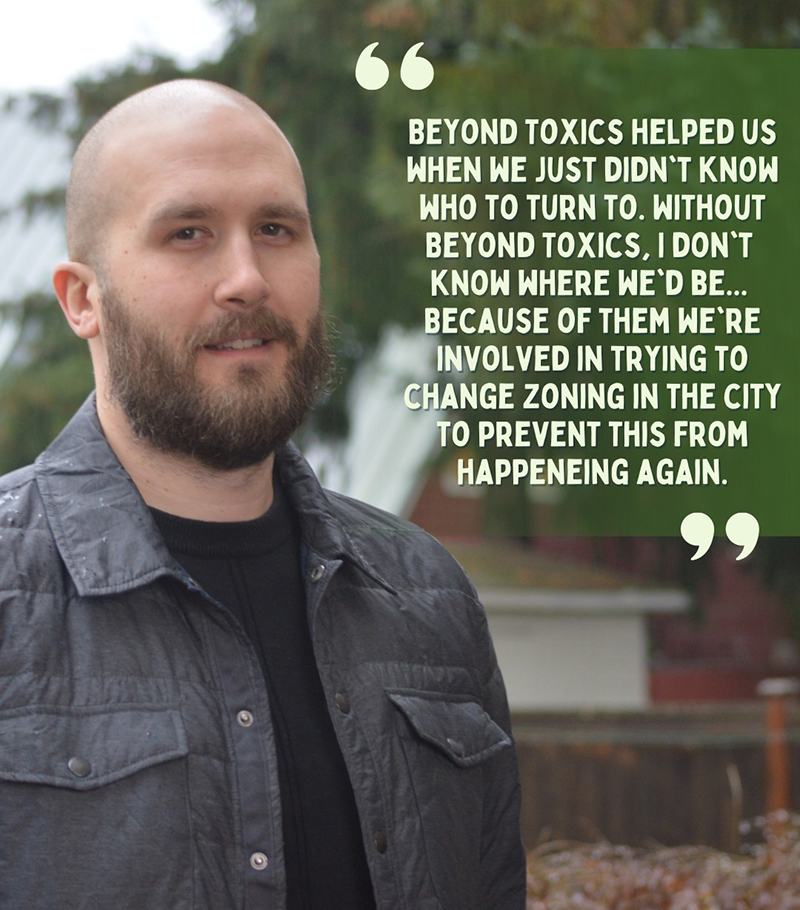
Jeremy and Ali have lived in their Bethel neighborhood home for four and a half years. The large backyard opens up to Peterson Barn Park, has plenty of gardening space and room for fetch with their pup. They, too, noticed the stench of industrial pollution shortly after moving in.
“Initially it was something we’d notice almost daily, any time we’d go outside there was like a really strong toxic odor,” Jeremy said. “Our dog would smell it, we would smell it, so if we were trying to run outside or walk outside we’d have to immediately come back inside. The longer that we were exposed to it, the more it would irritate your lungs and eyes.”
Lin's Story
Lin is a longtime Bethel resident and community activist and has lived in the area for over 25 years. She is co-chair of the Active Bethel Citizens organization that partnered with Beyond Toxics and other community members which teamed up to find solutions to the pollution problems plaguing their neighborhood.
Together, with Beyond Toxics, Lin is working with local agencies to bring about change. The agencies, “listened to what the people feel, what we smell and how we’re living and what dangers there are to us. Lin said the agencies finally realized that “Bethel neighbors are people, and not just data points.”
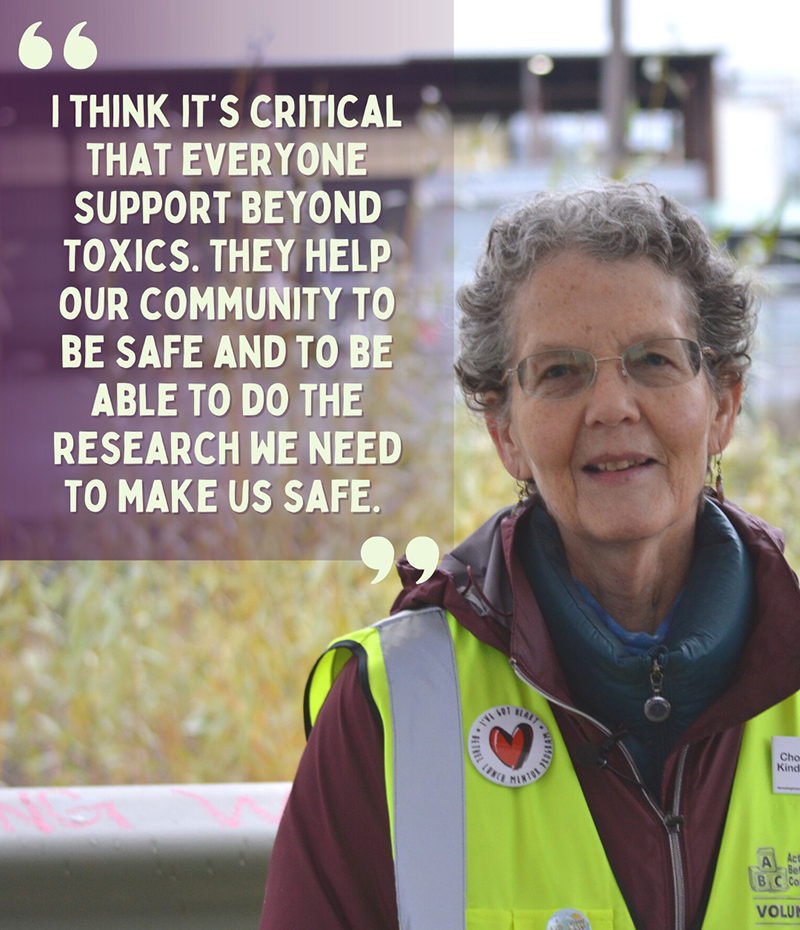
About SFOC & Emily
Stories From Our Community is a series that explores real ways Beyond Toxics is making a difference in the lives of our community members. The series is written by Emily Matlock, Membership and Communications Coordinator at Beyond Toxics and former journalist.






